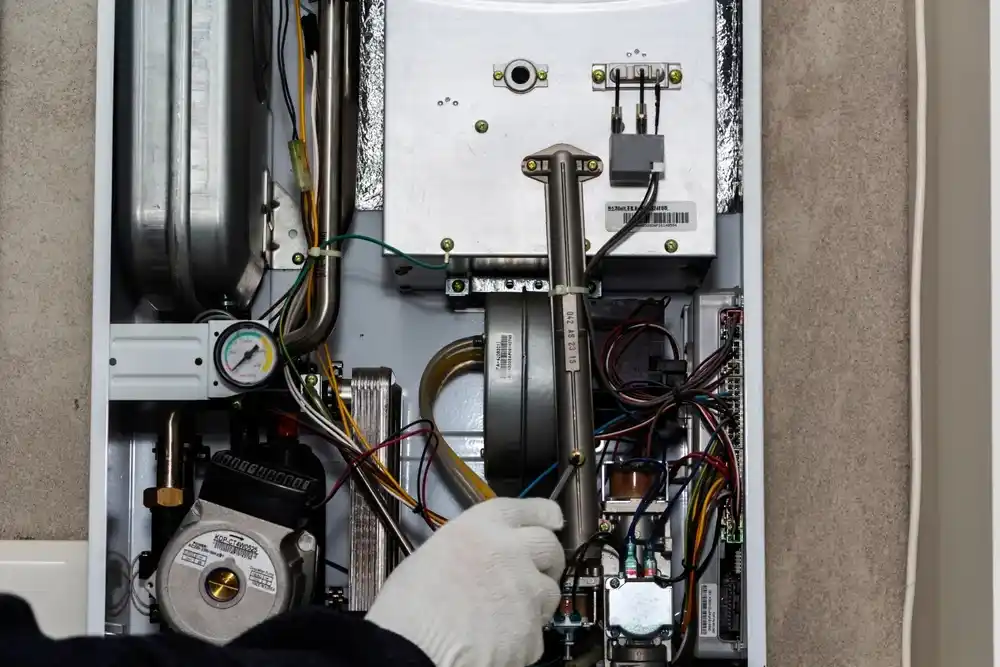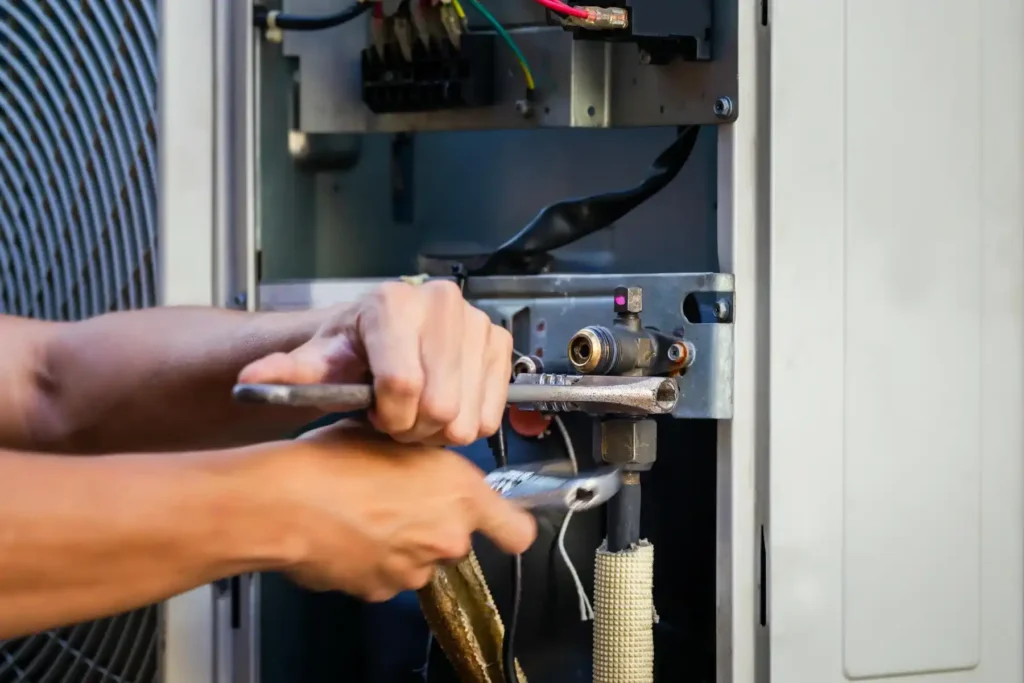Get the best heat pump repair, maintenance, service and installation services near you.


After fifteen Puget Sound winters, Rachel had gotten used to the hum of her old gas furnace. It was a reliable fixture—loud, a little clunky, but it kept her family warm through snow flurries and subfreezing nights. Still, the last few winters had brought more repairs, and the heating bills seemed to rise with each cold snap.
One frosty January morning, after waking up to a 62-degree house and a blinking error light on the thermostat, Rachel had had enough. Her furnace was out—again. The repair tech confirmed it: the heat exchanger was cracked. It could be repaired, but the cost made her pause.
She’d heard neighbors talk about switching to heat pumps. “Efficient, all-electric, and way better for the planet,” her friend Lisa had said. At first, Rachel was skeptical. Could a heat pump really handle a brutal Puget Sound winter?
Curious—and out of patience—Rachel called Fast HVAC. Our technician walked her through the options, explaining how modern cold-climate heat pumps were built to work even when the temperature dipped below zero. “They’re quiet, energy-efficient, and with utility rebates, the upfront cost isn’t as scary as people think,” he told her.
After crunching the numbers and seeing the rebate she could get from her energy provider, Rachel made the switch. Within days, her old furnace was gone, replaced by a sleek, whisper-quiet heat pump system. That winter, her energy bills dropped, the house stayed evenly warm, and for the first time in years, she didn’t worry about mid-season breakdowns.
Furthermore, the heat pump also cooled her house during the summer months. The cost of a separate air conditioning system was prohibitive to Rachel, so she and her family made-do with desk fans.
Looking out at the snow-covered yard one evening, sipping tea in a perfectly cozy living room, Rachel smiled. “Best decision I’ve made all year,” she thought.
Heat pumps are one of the most energy-efficient HVAC systems available.
A single heat pump system provides both heating in the winter and cooling in the summer.
Many utility companies and government programs offer rebates, tax credits, and incentives.
Heat pumps produce fewer greenhouse gas emissions compared to traditional gas or oil systems.
Modern heat pumps help filter and circulate air more effectively, reducing allergens and maintaining consistent humidity levels.
Today’s heat pumps are designed for whisper-quiet operation while maintaining even temperatures throughout the home.
With fewer moving parts and no combustion process, heat pumps require less maintenance.
Heat pumps offer an efficient, eco-friendly solution for year-round comfort—making them a top choice for homeowners in King and Snohomish counties. While the concept dates back to the 1850s, heat pumps gained widespread popularity in the 1970s during the oil crisis, thanks to their ability to provide both heating and cooling from a single system. Today’s heat pump technology is more advanced than ever, offering improved performance, quieter operation, and greater energy savings. As climate-conscious living becomes more important, heat pumps are quickly becoming a go-to option for modern homes. Though the initial investment can be higher than traditional systems, the long-term benefits—like lower energy bills, enhanced indoor air quality, and reduced carbon footprint—make them a worthwhile upgrade for comfort and efficiency.




Choosing a new heat pump system isn’t a one-size-fits-all decision. Homeowners rely on the expertise of Fast HVAC’s licensed HVAC technicians to guide them through the process, ensuring the system installed is efficient, cost-effective, and tailored to their home’s unique needs. Here’s a closer look at how our professionals determine the best heat pump for your household:
The first step in selecting a new heat pump is performing a thorough home evaluation. HVAC technicians use tools and calculations—most notably the Manual J load calculation—to determine how much heating and cooling your home actually needs. This includes factoring in square footage, number and size of windows, insulation levels, orientation of the home, number of occupants, air leakage and ventilation. This ensures that the system installed isn't too small (leading to constant running and poor comfort) or too large (resulting in short cycling and wasted energy).
If your home has existing ductwork, technicians will inspect it for leaks, damage, or poor design. A high-efficiency heat pump can lose effectiveness if paired with inefficient ducts. If ductwork isn’t present or is in poor condition, technicians might recommend ductless mini-split systems as an alternative.
Next, our HVAC professionals help you weigh the energy efficiency of various models. Heat pumps are rated by SEER (Seasonal Energy Efficiency Ratio) for cooling and HSPF (Heating Seasonal Performance Factor) for heating. Higher numbers mean greater efficiency—and potential long-term savings on energy bills. However, efficiency often comes at a higher upfront cost. Our technician will walk you through options that balance performance and price based on your budget and goals. They’ll also inform you about available rebates, tax credits, or utility incentives that can make high-efficiency systems more affordable.
Today’s heat pumps offer a range of features such as: Variable-speed compressors for precise temperature control; Smart thermostats and remote access; Zoned heating and cooling capabilities; Quiet operation and improved air filtration. Our HVAC technicians will ask about your comfort preferences, whether you want advanced technology, or are just looking for a straightforward system.
Once the ideal system is selected, our technicians plan the installation process. This includes ensuring proper placement of the outdoor and indoor units, making electrical and refrigerant line connections, verifying airflow and refrigerant charge, and testing the system for safe, efficient operation. Our professional installation ensures warranty compliance and long-term system reliability.
We are authorized dealers and installers of the most common and trusted furnace manufacturers.







Air-Source Heat Pumps (ASHP). This is the most common type used within the Pacific Northwest. These heat pumps transfers heat between your home and the outside air. In summer, it cools like an air conditioner. In winter, it extracts heat from outdoor air—even in cold temperatures—to warm your home. These heat pumps match well to the mild northwest climate, with mild to moderate winters. They provide high efficiency, especially with newer models. These heat pump types are also available in duct or ductless mini-split models.
Ground-Source (Geothermal) Heat Pumps. This is a rarity in our northwest. These heat pumps employ underground pipes to exchange heat with the stable earth temperature below your home. These are great for long-term homeowners, new builds, large lots. They are super-efficient, with low operating cost and are eco-friendly. However, they have a higher installation cost, with more space and excavation needed.
Water-Source Heat Pumps These heat pumps draw heat from a nearby water source like a pond, lake, or well. Obviously, these heat pumps apply to the rare home owner with near accessible water bodies. They are energy-efficient in suitable locations, but have considerable environmental regulations.
Hybrid (Dual-Fuel) Heat Pumps: These heat pumps combine a heat pump with a gas furnace. Hybrid heat pumps employ electricity for mild weather and switches to gas heat in freezing conditions. These heat pumps are great for cold climates with occasional extreme cold snaps. They provide efficient year-round, cost-saving flexibility, automatically switching between the most efficient fuel source.
Cold-Climate Heat Pumps. These are advanced air-source units designed with technology to extract heat from extremely cold air, extracting heat from zero degree weather. Since the pacific northwest seldom has such a harsh winter, these heat pumps are not found in the Puget Sound.
Obviously, there’s a variety of heat pump types and applications. With Fast HVAC’s expertise, you will receive the best match to your household needs and budget.


We know there are many choices when it comes to furnace repair, and we don’t take your trust for granted. As homeowners ourselves, we understand what it takes to provide quality service that we’d expect for our own homes.
Here’s why Fast Heating & Air should be your top choice for furnace repairs in the Greater Seattle Metro:

A heat pump is an energy-efficient system that provides both heating and cooling by transferring heat instead of generating it. In winter, it pulls heat from outside to warm your home; in summer, it removes heat from your home to cool it.
Heat pumps use electricity to move heat from one place to another. In heating mode, they absorb heat from the air (or ground) outside and transfer it indoors. In cooling mode, they reverse the process—similar to how an air conditioner works.
Yes! Modern cold-climate heat pumps are designed to work efficiently even in sub-zero temperatures. Some models include advanced compressors and refrigerants that allow them to perform well in freezing weather.
Air-Source Heat Pumps (ASHP): Most common; transfers heat between your home and the outdoor air. Ground-Source (Geothermal): Draws heat from underground for higher efficiency. Water-Source: Uses nearby water bodies (ponds/lakes) to transfer heat. Hybrid Systems: Combine heat pump with a gas furnace for flexibility.
Very! Heat pumps can deliver 2 to 4 times more heating energy than the electrical energy they consume. This makes them one of the most efficient HVAC options available today.
Yes. A heat pump can replace both your furnace and air conditioner, offering year-round comfort with one system. In colder regions, homeowners sometimes pair it with a gas furnace for backup (a dual-fuel system).
With proper maintenance, most heat pumps last 12–15 years. Ground-source models can last even longer—up to 25 years or more for the indoor unit, and 50+ years for the underground loop system.
Basic maintenance includes: Replacing or cleaning air filters monthly; Cleaning the outdoor coil; Clearing debris around the outdoor unit; Annual professional inspection and tune-up.
Yes! Many utilities, states, and the federal government offer rebates and tax incentives for heat pump installation—especially for high-efficiency or ENERGY STAR®-rated systems. Ask your HVAC contractor for current local offers.
It depends on your home’s insulation, climate, and comfort goals. An HVAC technician can assess your needs, perform load calculations, and recommend the best system for your layout and budget.
When it comes to reliable heat pump installation in the greater Seattle area, Fast HVAC is the trusted name homeowners have counted on since 1982. As a family-owned and operated business, we take pride in helping local families stay comfortable year-round. Whether you’re looking to boost your home’s energy efficiency, improve indoor air quality, or upgrade to a more reliable heating and cooling system, our expert team is here to help.
Our licensed, highly trained technicians bring years of experience and a commitment to quality on every job. We take the time to understand your home’s specific needs and recommend the best heat pump solution for lasting comfort and performance.
If you’re searching for the best heat pump systems and professional installation near you, reach out to Fast HVAC.



Let’s bring your vision to life with expert craftsmanship and thoughtful design.
16120 Woodinville Redmond Rd NE STE. 15
Woodinville, WA 98072
(206) 558 5112
hello@fastwaterheater.com
Monday – Friday 7:30am-5pm
24/7 Emergency Service Available
HVAC License
NORDSHA772L2
Electrical License
NORDSHA774MR





